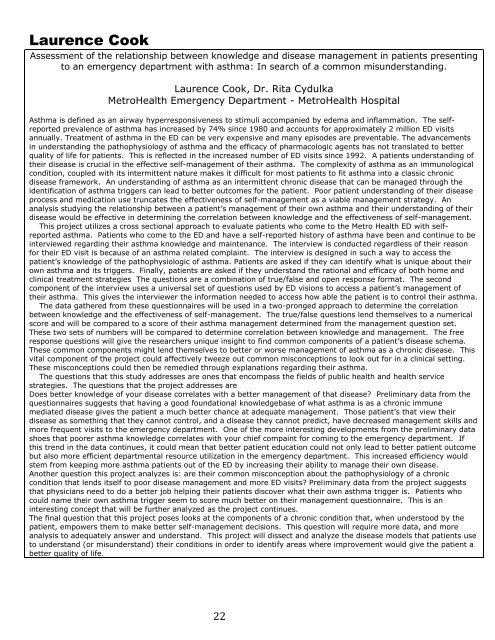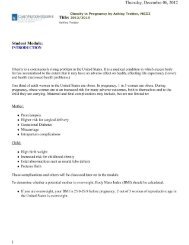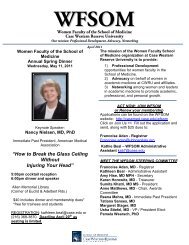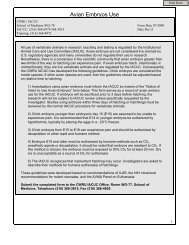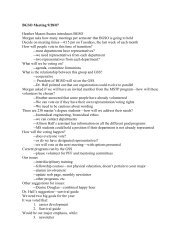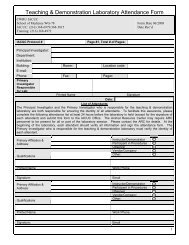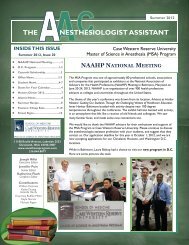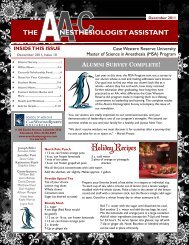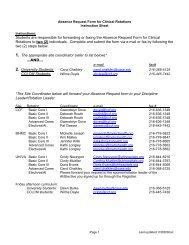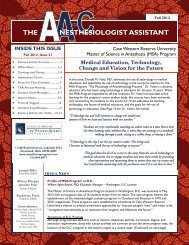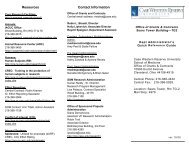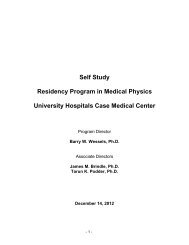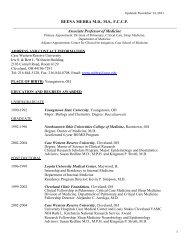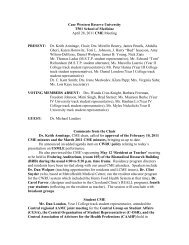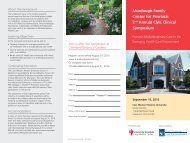student research day - Case Western Reserve University School of ...
student research day - Case Western Reserve University School of ...
student research day - Case Western Reserve University School of ...
You also want an ePaper? Increase the reach of your titles
YUMPU automatically turns print PDFs into web optimized ePapers that Google loves.
Laurence Cook<br />
Assessment <strong>of</strong> the relationship between knowledge and disease management in patients presenting<br />
to an emergency department with asthma: In search <strong>of</strong> a common misunderstanding.<br />
Laurence Cook, Dr. Rita Cydulka<br />
MetroHealth Emergency Department - MetroHealth Hospital<br />
Asthma is defined as an airway hyperresponsiveness to stimuli accompanied by edema and inflammation. The selfreported<br />
prevalence <strong>of</strong> asthma has increased by 74% since 1980 and accounts for approximately 2 million ED visits<br />
annually. Treatment <strong>of</strong> asthma in the ED can be very expensive and many episodes are preventable. The advancements<br />
in understanding the pathophysiology <strong>of</strong> asthma and the efficacy <strong>of</strong> pharmacologic agents has not translated to better<br />
quality <strong>of</strong> life for patients. This is reflected in the increased number <strong>of</strong> ED visits since 1992. A patients understanding <strong>of</strong><br />
their disease is crucial in the effective self-management <strong>of</strong> their asthma. The complexity <strong>of</strong> asthma as an immunological<br />
condition, coupled with its intermittent nature makes it difficult for most patients to fit asthma into a classic chronic<br />
disease framework. An understanding <strong>of</strong> asthma as an intermittent chronic disease that can be managed through the<br />
identification <strong>of</strong> asthma triggers can lead to better outcomes for the patient. Poor patient understanding <strong>of</strong> their disease<br />
process and medication use truncates the effectiveness <strong>of</strong> self-management as a viable management strategy. An<br />
analysis studying the relationship between a patient’s management <strong>of</strong> their own asthma and their understanding <strong>of</strong> their<br />
disease would be effective in determining the correlation between knowledge and the effectiveness <strong>of</strong> self-management.<br />
This project utilizes a cross sectional approach to evaluate patients who come to the Metro Health ED with selfreported<br />
asthma. Patients who come to the ED and have a self-reported history <strong>of</strong> asthma have been and continue to be<br />
interviewed regarding their asthma knowledge and maintenance. The interview is conducted regardless <strong>of</strong> their reason<br />
for their ED visit is because <strong>of</strong> an asthma related complaint. The interview is designed in such a way to access the<br />
patient’s knowledge <strong>of</strong> the pathophysiologic <strong>of</strong> asthma. Patients are asked if they can identify what is unique about their<br />
own asthma and its triggers. Finally, patients are asked if they understand the rational and efficacy <strong>of</strong> both home and<br />
clinical treatment strategies The questions are a combination <strong>of</strong> true/false and open response format. The second<br />
component <strong>of</strong> the interview uses a universal set <strong>of</strong> questions used by ED visions to access a patient’s management <strong>of</strong><br />
their asthma. This gives the interviewer the information needed to access how able the patient is to control their asthma.<br />
The data gathered from these questionnaires will be used in a two-pronged approach to determine the correlation<br />
between knowledge and the effectiveness <strong>of</strong> self-management. The true/false questions lend themselves to a numerical<br />
score and will be compared to a score <strong>of</strong> their asthma management determined from the management question set.<br />
These two sets <strong>of</strong> numbers will be compared to determine correlation between knowledge and management. The free<br />
response questions will give the <strong>research</strong>ers unique insight to find common components <strong>of</strong> a patient’s disease schema.<br />
These common components might lend themselves to better or worse management <strong>of</strong> asthma as a chronic disease. This<br />
vital component <strong>of</strong> the project could affectively tweeze out common misconceptions to look out for in a clinical setting.<br />
These misconceptions could then be remedied through explanations regarding their asthma.<br />
The questions that this study addresses are ones that encompass the fields <strong>of</strong> public health and health service<br />
strategies. The questions that the project addresses are<br />
Does better knowledge <strong>of</strong> your disease correlates with a better management <strong>of</strong> that disease? Preliminary data from the<br />
questionnaires suggests that having a good foundational knowledgebase <strong>of</strong> what asthma is as a chronic immune<br />
mediated disease gives the patient a much better chance at adequate management. Those patient’s that view their<br />
disease as something that they cannot control, and a disease they cannot predict, have decreased management skills and<br />
more frequent visits to the emergency department. One <strong>of</strong> the more interesting developments from the preliminary data<br />
shoes that poorer asthma knowledge correlates with your chief compaint for coming to the emergency department. If<br />
this trend in the data continues, it could mean that better patient education could not only lead to better patient outcome<br />
but also more efficient departmental resource utilization in the emergency department. This increased efficiency would<br />
stem from keeping more asthma patients out <strong>of</strong> the ED by increasing their ability to manage their own disease.<br />
Another question this project analyzes is: are their common misconception about the pathophysiology <strong>of</strong> a chronic<br />
condition that lends itself to poor disease management and more ED visits? Preliminary data from the project suggests<br />
that physicians need to do a better job helping their patients discover what their own asthma trigger is. Patients who<br />
could name their own asthma trigger seem to score much better on their management questionnaire. This is an<br />
interesting concept that will be further analyzed as the project continues.<br />
The final question that this project poses looks at the components <strong>of</strong> a chronic condition that, when understood by the<br />
patient, empowers them to make better self-management decisions. This question will require more data, and more<br />
analysis to adequately answer and understand. This project will dissect and analyze the disease models that patients use<br />
to understand (or misunderstand) their conditions in order to identify areas where improvement would give the patient a<br />
better quality <strong>of</strong> life.<br />
22


